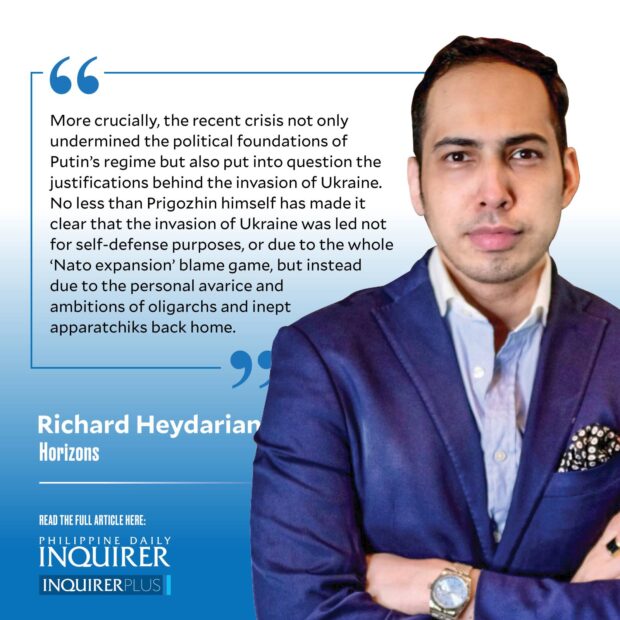Putin’s Russia: Short coup, long crisis?
 Former president Rodrigo Duterte once described his Russian counterpart Vladimir Putin as his “favorite hero.” During his tenure, the fanboy would manage to meet his idol several times, twice in Moscow alone.
Former president Rodrigo Duterte once described his Russian counterpart Vladimir Putin as his “favorite hero.” During his tenure, the fanboy would manage to meet his idol several times, twice in Moscow alone.
But the former demagogue in Malacañang wasn’t the only macho leader simping for Putin, who repeatedly topped the Forbes list of the world’s powerful leaders. Countless other populists, most notably former president Donald Trump, have publicly fawned over the Man in Kremlin. Former Indonesian general Prabowo Subianto even tried to pull off a Putin-style shirtless stunt during his latest presidential bid.
Putin’s carefully choreographed image as the undisputable leader of the world’s largest nation clearly impressed many (impressionable) outsiders. Over the weekend, however, a bizarre chain of events served as a wake-up call for a whole host of amateurs the world over.
Article continues after this advertisementAfter the spectacular failure of Russia’s invasion of Ukraine, which embarrassed many of Putin’s apologists, there are growing signs of major fissures within the country’s political system. Yevgeny Prigozhin, one of Putin’s most trusted allies and former “chef,” directly challenged the Russian regime with relative ease.
After months of public rants against Russia’s top defense officials, Prigozhin’s Wagner mercenary army, which was hitherto serving at the frontline of the occupation of Ukraine, seamlessly gobbled up military bases in southern Russia (Rostov) and then marched all the way to Moscow without much resistance.
As if this weren’t surreal enough, there was another plot twist before the day ended: At the 11th hour, Putin’s former chef reversed gears following a supposed deal with Belarussian strongman Alexander Lukashenko, who effectively saved his ally in Moscow. At least, for now.
Article continues after this advertisementWhat makes the purported “deal” bizarre is that just hours earlier Putin had branded the Wagner chief as a traitor, who “betrayed” Russia out of “personal ambition.” The Man in Kremlin spoke of “harsh” punishment. But now, all of a sudden, there was a supposed compromise, which guaranteed legal immunity and safety to the rebel leader and his fellow mutineers? Winston Churchill’s description of Russia as “a riddle, wrapped in a mystery, inside an enigma” was perhaps an understatement.
If this were ever a scripted spectacle, as naive conspiracy theorists maintain, then it clearly went off-script. None of Russia’s major players comes out of this crisis in a better position, most notably the supposedly unquestionable leader of the country. Dear reader, it’s hard to predict what comes next, but the mind-boggling crisis raised three important issues.
First of all, it underscored the questionable judgment of impressionable outsiders such as Duterte, who easily fell for the image of Putin’s Russia. As some military analysts sardonically put it: Russia’s military went from the “second most powerful on earth” (in 2021) to the “second most powerful in Ukraine” (in 2022), just to end up as “the second most powerful in Russia” (in 2023).
More crucially, the recent crisis not only undermined the political foundations of Putin’s regime but also put into question the justifications behind the invasion of Ukraine. No less than Prigozhin himself has made it clear that the invasion of Ukraine was led not for self-defense purposes, or due to the whole “Nato expansion” blame game, but instead due to the personal avarice and ambitions of oligarchs and inept apparatchiks back home.
“[They] tell a story that there was insane aggression from the Ukrainian side and they were going to attack us together with the whole Nato bloc,” Prigozhin says in one of his public videos on the genesis of the conflict in Ukraine, but actually “[they] are trying to deceive the [Russian] society and the president …”
The third thing that the crisis also exposed was Putin’s antipathy toward the political Left, especially when he effectively compared Prigozhin’s mutiny to Russia’s all-out crisis in 1917 when Bolsheviks violently hijacked the state in the twilight months of World War II. Now this is crucial precisely because many of Kremlin’s apologists tend to be self-described progressives, including charlatans who vociferously and unabashedly downplayed the threat of invasion of Ukraine last year as nothing but “Biden’s war hype.” In the words of Yanis Varoufakis, a genuine progressive who has stood up to both Western and Eastern imperialism, Putin’s “1917 comparison” is a “reminder to leftists who erred into tolerating Putin: He always hated the Left!”
—————–
rheydarian@inquirer.com.ph
















